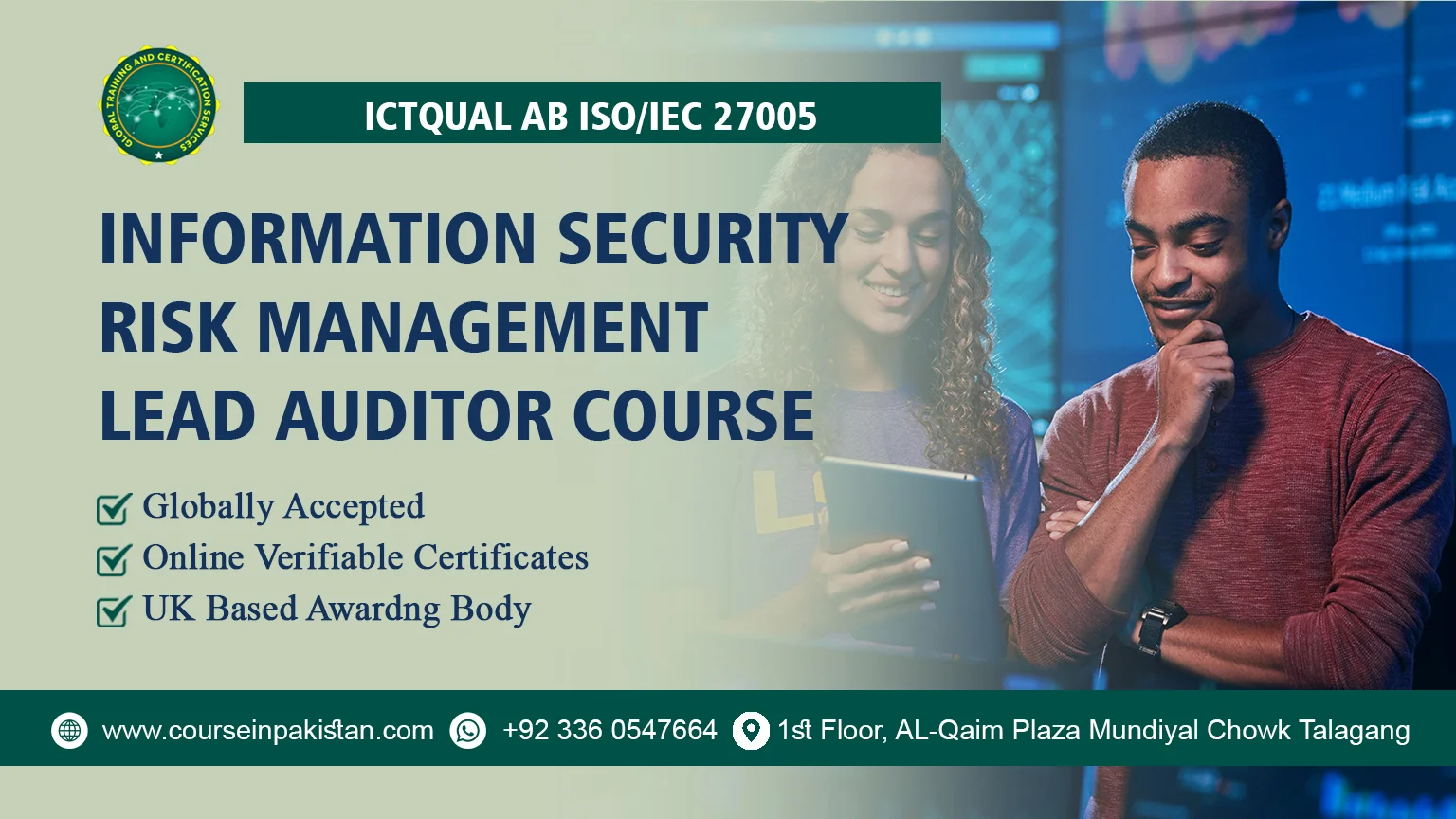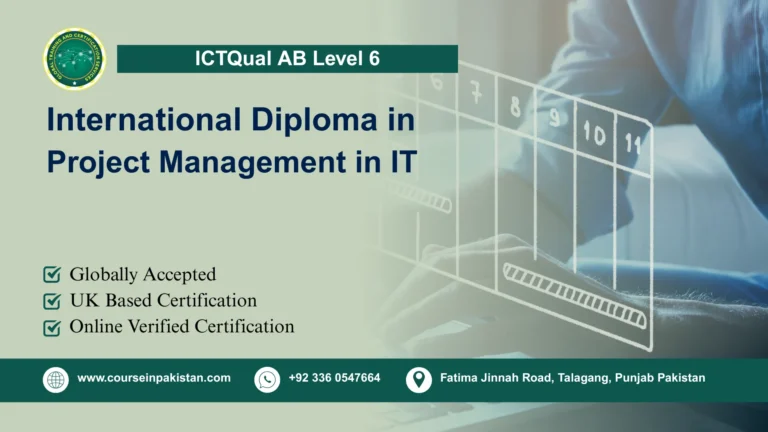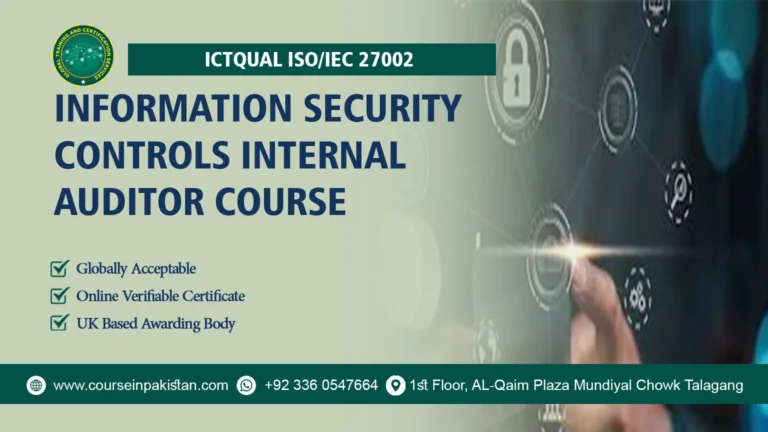
ICTQual ISO/IEC 27005 Information Security Risk Management Lead Auditor Course
In an increasingly digital world where information security is paramount, organizations face escalating risks from cyber threats. The ISO/IEC 27005 Information Security Risk Management Lead Auditor Course is designed to equip professionals with the expertise to audit and enhance information security risk management systems according to international standards. This specialized training empowers participants to lead efforts in identifying, assessing, and mitigating information security risks, ensuring organizational resilience and compliance.
Course Introduction
ISO/IEC 27005 provides guidelines for establishing, implementing, maintaining, and continually improving Information Security Risk Management Systems (ISRM). The Lead Auditor course focuses on training individuals to audit ISRM against ISO/IEC 27005 standards. This certification ensures that organizations can effectively manage information security risks, protect critical assets, and maintain operational continuity.
Course Overview
The course encompasses comprehensive modules designed to delve into the intricacies of information security risk management system auditing. Participants gain insights into auditing techniques, risk assessment methodologies, risk treatment strategies, and strategies for continuous improvement tailored to information security.
Course Benefits
Enrolling in the ISO/IEC 27005 Lead Auditor Course offers numerous benefits:
- Specialized Expertise: Develops specialized knowledge in auditing information security risk management systems.
- Career Advancement: Enhances career prospects in cybersecurity management, risk assessment, and auditing roles.
- Organizational Resilience: Equips organizations with tools to identify, assess, and mitigate information security risks effectively.
- Global Recognition: Demonstrates commitment to international standards and enhances credibility globally in information security risk management.
Course Study Units
The curriculum typically covers essential study units such as:
- Introduction to Information Security Risk Management
- ISO/IEC 27005 Framework and Requirements
- Risk Identification and Assessment
- Risk Treatment and Mitigation
- Risk Communication and Documentation
- Auditing Principles and Techniques
- Audit Planning and Preparation
- Conducting Audits and Evaluating Compliance
- Reporting and Follow-Up
Learning Outcomes
Introduction to Information Security Risk Management
Learning Outcomes:
- Understand the importance of information security risk management in protecting organizational assets.
- Identify key concepts and principles related to risk management in the context of information security.
- Explain the benefits of implementing effective risk management practices within organizations.
- Recognize the role of risk management in ensuring business continuity and resilience against cyber threats.
ISO/IEC 27005 Framework and Requirements
Learning Outcomes:
- Summarize the purpose, scope, and structure of ISO/IEC 27005.
- Outline the key components and requirements specified in ISO/IEC 27005.
- Understand how ISO/IEC 27005 integrates with ISO/IEC 27001 and other related standards.
- Evaluate the benefits of adopting ISO/IEC 27005 for enhancing information security risk management frameworks.
Risk Identification and Assessment
Learning Outcomes:
- Develop techniques for identifying and categorizing information security risks.
- Conduct risk assessments using qualitative, quantitative, or hybrid methodologies.
- Analyze risk assessment results to prioritize risks based on their likelihood and potential impact.
- Recommend improvements to enhance the effectiveness and accuracy of risk identification and assessment processes.
Risk Treatment and Mitigation
Learning Outcomes:
- Define risk treatment options, including risk avoidance, risk reduction, risk sharing, and risk acceptance.
- Develop risk treatment plans tailored to mitigate identified risks to acceptable levels.
- Implement controls and safeguards to reduce the likelihood and impact of identified risks.
- Monitor and review the effectiveness of risk treatment measures in achieving desired risk reduction outcomes.
Risk Communication and Documentation
Learning Outcomes:
- Establish communication channels and protocols for sharing information about identified risks.
- Document risk management processes, decisions, and outcomes effectively.
- Communicate risk management strategies and recommendations to stakeholders, including management and relevant parties.
- Ensure transparency and accountability in documenting risk management activities and decisions.
Auditing Principles and Techniques
Learning Outcomes:
- Define auditing principles and their application in information security risk management.
- Develop a structured approach to planning, conducting, and reporting risk management audits.
- Apply audit methodologies, including interviews, document reviews, and observations, to gather audit evidence effectively.
- Ensure compliance with auditing standards, regulatory requirements, and organizational policies during risk management audits.
Audit Planning and Preparation
Learning Outcomes:
- Develop comprehensive audit plans outlining audit objectives, scope, and criteria.
- Identify resources and allocate roles and responsibilities for conducting risk management audits.
- Prepare audit documentation, including checklists, procedures, and audit schedules.
- Communicate audit plans effectively to stakeholders and gain necessary approvals before initiating audits.
Conducting Audits and Evaluating Compliance
Learning Outcomes:
- Execute audit activities according to the planned schedule, methodology, and scope.
- Collect and analyze audit evidence to evaluate compliance with ISO/IEC 27005 requirements and organizational policies.
- Assess the effectiveness of risk management controls and practices in mitigating identified risks.
- Document audit findings accurately and objectively, including non-conformities and areas for improvement.
Reporting and Follow-Up
Learning Outcomes:
- Prepare clear and concise audit reports documenting risk management audit findings, conclusions, and recommendations.
- Communicate audit results effectively to stakeholders, including management and regulatory authorities.
- Provide actionable recommendations for corrective actions and improvements based on audit findings.
- Monitor the implementation of audit recommendations and verify closure of identified issues to ensure continuous improvement.
These learning outcomes collectively prepare participants to effectively audit Information Security Risk Management Systems (ISRM) against ISO/IEC 27005 standards. They ensure alignment with best practices, compliance with regulatory requirements, and continuous improvement in risk management practices within organizations.
Who Should Take This Course
The course is ideally suited for IT security managers, risk managers, auditors, and professionals responsible for managing or auditing information security risk management systems within organizations. It is particularly valuable for those looking to deepen their understanding of ISO/IEC 27005 requirements and advance their careers in cybersecurity management, risk assessment, and auditing roles.
Future Progression for This Course
Successful completion of the ISO/IEC 27005 Lead Auditor Course opens doors to several opportunities:
- Advanced Certifications: Pursue advanced certifications in information security management or related standards.
- Consultancy Roles: Provide expert advice on implementing ISO/IEC 27005 and improving risk management practices.
- Organizational Leadership: Lead initiatives to enhance information security risk management frameworks, mitigate risks, and ensure regulatory compliance.
- Continuous Learning: Stay updated with emerging threats, technologies, and best practices in information security risk management to maintain organizational readiness and resilience.
ISO/IEC 27005 Information Security Risk Management Lead Auditor Course is essential for organizations aiming to strengthen their defenses against evolving cyber threats and maintain operational continuity. It equips professionals with the skills to audit risk management systems against international standards, ensuring compliance, continuous improvement, and ultimately contributing to enhanced information security and organizational resilience. As information security risks continue to evolve, the demand for qualified auditors proficient in ISO/IEC 27005 is set to increase, making this course a valuable investment in both personal career development and organizational security posture in the digital era.






